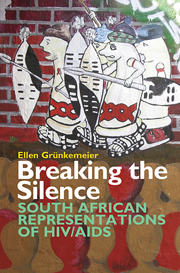5 - Myths
Published online by Cambridge University Press: 05 October 2013
Summary
The apparently ‘sudden’ emergence of a ‘new’ and ‘fatal’ disease has given rise to mythifications that shape the social construction and perception of the pandemic. One of the most prominent examples is the naturalised association of the virus with homosexuality (see Chapter 2). Generally speaking, myth is a cultural construction through language, imbued with meanings, connotations and ideologies. In his text ‘Myth Today’, published in his well-known work Mythologies (1957), Roland Barthes explains that myth goes beyond the lexical meaning of a sign and refers to a broader meaning or meta-message. Contrary to the linguistic system in which the connection between signifier and signified is arbitrary, mythical meanings are ‘always in part motivated’ (Barthes 1993, 112) in order to make the myth more effective. Nevertheless, the motivation is fragmentary; it is not ‘natural’ but ‘naturalised’ (ibid., 116). Due to this constructed causality, myth seems to be ‘justified’, to be ‘innocent speech’ (ibid., 118), thereby inviting people to accept it without asking further questions or exposing problems.
Myth does not deny things, on the contrary, its function is to talk about them; simply, it purifies them, it makes them innocent, it gives them a natural and eternal justification, it gives them a clarity which is not that of an explanation but that of a statement of fact. (ibid., 132)
My study draws upon and expands Barthes's work: to explain the relation between myth and its meaning, Barthes speaks of ‘deformation’ or ‘distortion’ (ibid., 108) and his choice of words suggests that there was a ‘myth-free social reality’ which, in myth, is ‘misconceived’ or ‘mis-represented’, implying that there are ‘right’ and ‘wrong’ representations.
- Type
- Chapter
- Information
- Breaking the SilenceSouth African Representations of HIV/AIDS, pp. 114 - 162Publisher: Boydell & BrewerPrint publication year: 2013



